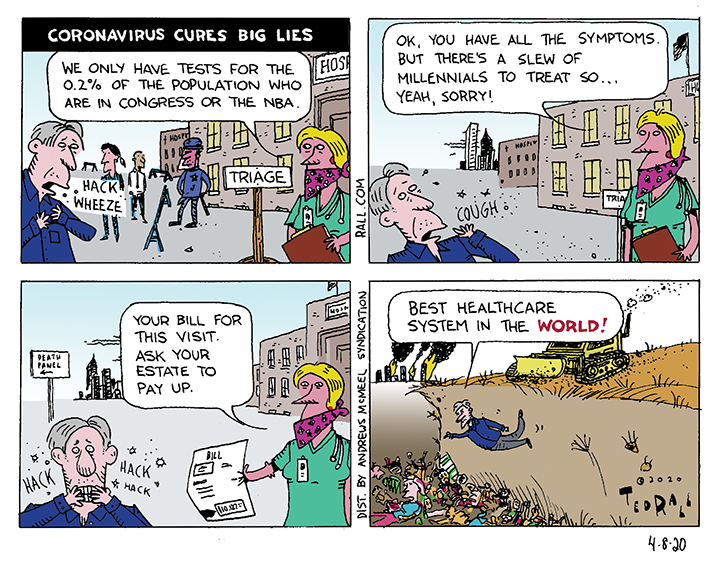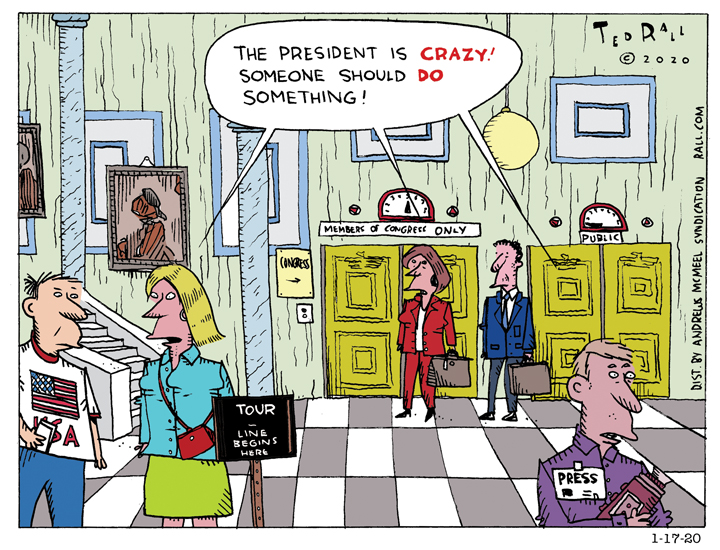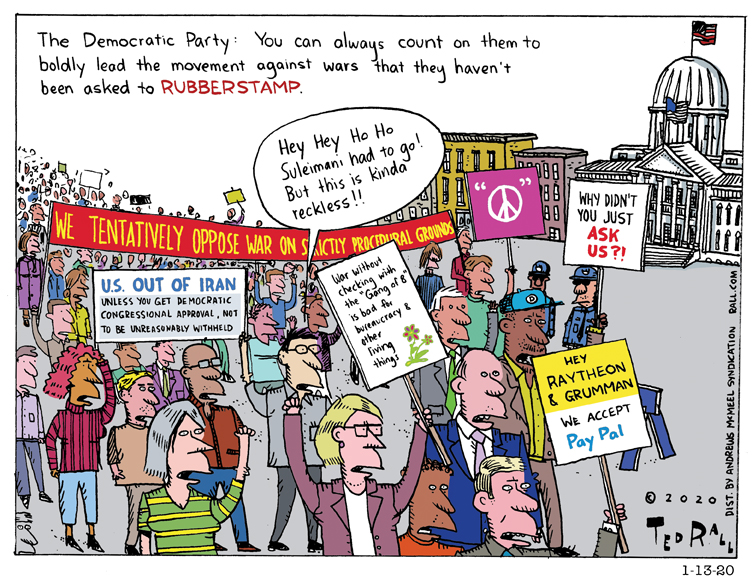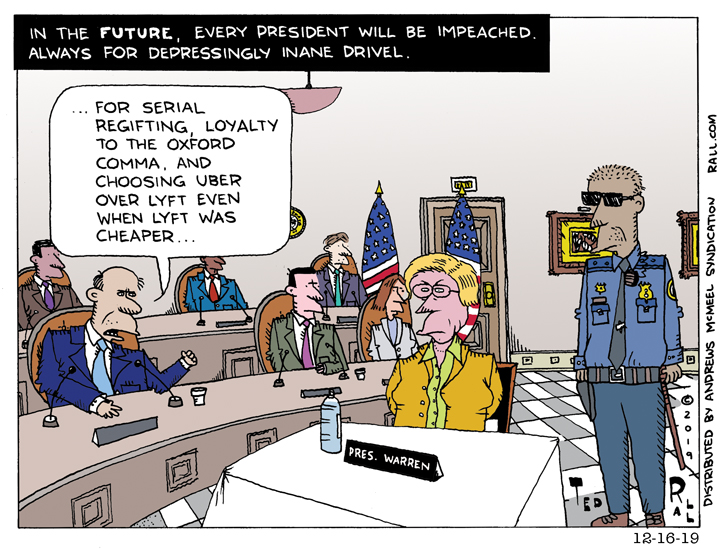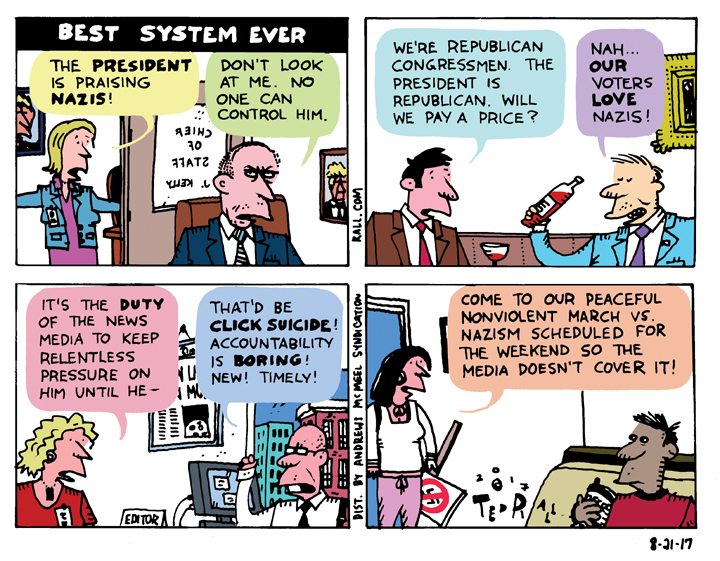For decades we have been told that we should not have a socialized or national healthcare plan in the United States because this country has the best healthcare system in the world. Obviously the coronavirus pandemic and the total absence of medical coverage or testing ability or adequate space in hospitals proves that that was always a lie.
The President Is Crazy. Someone Should Do Something.
Everyone agrees that President Trump seems to have been exposed as unfit for office in the week of his rash assassination of a top Iranian general. But who is going to act? The public is scared because they know that protest doesn’t work and that it often turns protesters into targets of surveillance. Congress won’t act because they are cowards and are owned by major corporations. And the media won’t do anything for the same reason.
In the Future Every President Will Be Impeached over Drivel
After Democrats impeach President Trump on a relatively narrow charge of trying to influence Ukraine by withholding military aid and requesting that that country investigate Joe Biden and his son Hunter Biden, it seems pretty clear that big issues will no longer be on the table and that impeachment will become a routine matter.
Here is Exactly Why Congress Won’t Act on Gun Violence, Climate Change, Impeaching Trump or Anything Else
 I’m from Dayton so I’m thinking about this today: Why hasn’t Congress done anything to address our national epidemic of mass shootings, namely reviving the assault weapons ban? People—Democrats and not a few Republicans—ask me that all the time. I bet all left-leaning pundits get that question.
I’m from Dayton so I’m thinking about this today: Why hasn’t Congress done anything to address our national epidemic of mass shootings, namely reviving the assault weapons ban? People—Democrats and not a few Republicans—ask me that all the time. I bet all left-leaning pundits get that question.
The answer is simple. But it’s not something most people want to hear. It’s the same answer I give to another question I get a lot: why hasn’t Trump been impeached?
Congress hasn’t gotten off its collective pasty lobbyist-fattened ass because the streets of every major city are not currently filled with millions of pissed-off people throwing rocks at store windows and who refuse to go home until Congress passes real gun control.
Democratic voters want Trump impeached. They want it—lackadaisically. They don’t want him impeached so badly that millions of demonstrators are willing to fill the streets of every major city day after day, night after night, turning over police cars and setting stuff on fire, until Nancy Pelosi begins impeachment hearings.
This is a fun game! You name an issue lots of people care about. I’ll explain why the political class is ignoring it.
For example: What with experts predicting imminent human extinction, 98% of Americans are worried about climate change. (Who are the 2%? Happy to die but too lazy to commit suicide?) So why isn’t the U.S. government doing anything about it? Because—yes, you’ve got it now—the streets of America’s major cities are not choked by millions of citizens up for breaking things and fighting back the cops 24-7 until the politicians do something to increase humanity’s odds of survival.
You may disagree with my answers on the grounds that breaking windows is mean to storeowners, that burning things generates toxic gases, that cops are scary or that it’s more fun to sit home watching TV or playing video games than to run around in the streets dodging tear gas. You can rightly point out that the United States has no organized left-wing political group, much less one on the grassroots level, capable of organizing a mass street movement. You can, even more rightly, point out that we shouldn’t have to take to the streets because it’s Congress’ goddamn job to fix the environment and get rid of our insane president and ban the sale of military-grade guns to inbred derps.
What you cannot argue is that I am wrong.
It is an irrefutable incontrovertible fact that, when the nation’s cities are clogged with millions of angry Americans demanding radical change day after night after day after night, who break stuff and refuse to disperse and fight back against the cops and are willing to get beaten up and sometimes killed for their cause, and it’s impossible to carry on business as usual, our worthless public officials will yield to their demands and do what’s right.
Until then, mass shooters will continue to terrorize our public spaces, SUVs will belch greenhouse gases and Trump will tweet crazy racist BS. Bad things happen because good people don’t force them to stop.
Wishing out loud for other people, like Congress, to do something is worse than worthless. It’s damaging. You’re abdicating your responsibility to act. If you trust in “leaders” whose history shows they can’t be trusted, you’re committing political suicide.
(Ted Rall (Twitter: @tedrall), the political cartoonist, columnist and graphic novelist, is the author of “Francis: The People’s Pope.” You can support Ted’s hard-hitting political cartoons and columns and see his work first by sponsoring his work on Patreon.)
SYNDICATED COLUMN: To Do Next for the #NeverAgain Movement: Settle on a Clear Demand
 Notice the signs: where are the exact demands for Congress?
Notice the signs: where are the exact demands for Congress?
Eight hundred thousand people participated in the March for Our Lives rally in Washington on March 24th, say organizers with the #NeverAgain movement sparked by the Parkland, Florida school massacre. The turnout was impressive — but will it lead to new gun legislation?
History suggests no. But victory is achievable — if rallies are sharpened in focus.
Enthusiasm is necessary to launch a movement. Careful strategizing is required to sustain and grow it. The Million Moms March, also dedicated to curbing gun violence in 2000 drew a similar-sized crowd. Yet the next two decades saw one mass shooting after another, the NRA gaining rather than losing political influence, and a major reversal for the gun-control movement marked by the failure to renew the ban on assault weapons.
Whether it’s the Million Man March to promote unity and family values among African-American men or the 1981 Solidarity Day march to defend unions from Reagan-era attacks against organizations like the air traffic controllers union, there is a century-old tradition of large groups of Americans gathering in Washington, carrying signs, chanting slogans and being ignored by Congress and the president after they go home. To those shattered dreams you can add 2011’s Occupy Wall Street, another leaderless protest that came together and fizzled.
At almost all these events, speakers proclaimed themselves present at the continuation or initiation of a movement. But sustained movements must be organized. These were, like the Free Speech Movement at UC Berkeley in 1964, political spasms. Perhaps not theater as farce — but theater at most. At best, some presaged something later, bigger and effective.
Weighing in favor of the #NeverAgain movement’s chances of effecting real change is the role of social media, which can bring large groups of people together quickly. But they also need a simple, coherent, bumper-sticker-ready demand message.
Writing in USA Today, Rick Hampson argues that even the go-to granddaddy of all contemporary marches, where Martin Luther King, Jr. delivered his “I Have a Dream” speech, was less effective than advertised: “Even the 1963 civil rights march required so much effort, created so many internal divisions and produced so few immediate results (the 1964 Civil Rights Act was passed only after and because of President Kennedy’s assassination) that its leaders vowed never to attempt another.”
Hampson has a point. The 10 printed demands for the March on Washington remind us of American society’s failure to address the needs of the poor and oppressed since 1963. They wanted a $2-per-hour minimum wage, which is at least $15 today. Even Democratic presidential candidate Hillary Clinton refused to go over $12 in 2016. Still, they had a clear, coherent set of demands, beginning with: “Comprehensive and effective Civil Rights legislation from the present Congress — without compromise or filibuster — to guarantee all Americans: Access to all public accommodations, decent housing, adequate and integrated education, the right to vote.” And the Civil Rights Act did get passed.
The March 24th March for Our Lives opposed gun violence. The problem is, it failed to articulate a precise demand or set of demands.
“School safety is not a political issue,” read the Mission Statement. “There cannot be two sides to doing everything in our power to ensure the lives and futures of children who are at risk of dying when they should be learning, playing, and growing. The mission and focus of March For Our Lives is to demand that a comprehensive and effective bill be immediately brought before Congress to address these gun issues.”
Sorry, but those are weasel words.
“Address”?
How?
Should we ban large-capacity magazines?
Would restoring the assault-weapons ban be enough?
Should we, as retired Justice John Paul Stevens suggested recently, repeal the Second Amendment entirely and ban all guns?
Asking Congress to simply “address” an issue is an invitation for more endless debate leading nowhere, or to a compromise so watered down that it undermines the cause. (The ACA is an example of the latter.) A movement must settle on an area of clear focus. Unlike Occupy, which was split between reformists and revolutionaries and talked about everything from restoring the Glass-Steagall Act to eliminating homelessness, #NeverAgain has that part down pat.
An effective movement also has to settle on the solution to a problem. Proposing a path forward does not guarantee success: demonstrators had a clear, straightforward demand in 2002-03: do not invade Iraq. The Bush Administration ignored them. On the other hand, it’s now painfully clear which side was right. That will add to the credibility of antiwar marchers the next time a president tries to start a war of choice.
Settling on a clear solution, as opposed to asking the political class to “address” the issue, entails risk. For #NeverAgain, advocating for a comprehensive gun ban will push away allies who prefer a compromise approach. On the other hand, a more moderate approach will generate less excitement among those in favor of a radical solution (and moderation generally elicits less enthusiasm). But to take a page from gun-toting military folks, it’s better to go into battle with half an army than a whole one riddled with confusion and no idea why they’re fighting.
(Ted Rall, the editorial cartoonist and columnist, is the author of “Francis: The People’s Pope.”)
SYNDICATED COLUMN: Democrats Could Lose Again in 2018

You’re reading this, so you probably follow political punditry. And if you follow political punditry, you’ve been hearing the usual corporate suspects predict that one of two things will happen in this fall’s midterm elections: either the Democrats will win big (win back the Senate), or they’ll win really big (the House too). Outta the way, Congressional Republicans: here comes the Big Blue Wave!
Of course, these are the same clowns who called it big for President Hillary. Yet on and on they yammer, and we have to listen to them since big-money political media won’t hire anyone who has a clue.
Interestingly, there are early warning signs — just as there were throughout the 2016 presidential race — that Democrats may be counting their electoral chickens before they’re aborted.
“The Democratic advantage on the generic congressional ballot, which asks people whether they’ll vote for Democrats or Republicans for Congress, has dwindled since the heart of the tax debate in December,” Nate Cohn reports in The New York Times. “Then, nearly all surveys put Republicans behind by double digits. Now, poll averages put the Democratic lead at only around six or seven percentage points…the last two weeks of polls have gone further than a reversion to the mean. They’re arguably the best two weeks of polls for Republicans since the failure of the Senate health care bill in July. A highly sensitive poll average — like the FiveThirtyEight tracker — might put the Democratic lead down to roughly six points, basically the lowest level since the spring.”
As Cohn notes, there are nine long months to go before November. Things can and will change. Historically, the party in power usually gets “shellacked” during midterm elections. Democrats hope that voters will punish GOP senators and representatives as proxies for their party’s incredibly unpopular standardbearer.
People hate Trump. Yet Democrats have good cause for concern. Americans vote their pocketbooks, and their wallets are feeling better than they have in a long time. Unemployment hasn’t been this low since 9/11 — to the point that employers are complaining about labor shortages. Consumer confidence hasn’t been this high since Bill Clinton was president. Most people don’t own stocks, but the Dow is soaring — and that’s usually better for jobs than the other way around. Fuel prices have been lower. Like it or not (I don’t), the GOP’s tax bill is becoming more popular.
Given what a turd Trump is, you’d think the booming economy might not be enough to keep voters from turning out against incumbent Republicans this fall. But you’d be forgetting the Democratic Party’s inimitable talent for snatching defeat from the jaws of victory.
The Democrats are still hobbled by the same internal divisions that led to Clinton’s defeat. The Bernie progressives have the energy and the momentum but the DNC is still under the Clintonista jackboot. In most Republican districts, the Democratic challenger is a corporate right-winger Bernie’s peeps won’t care enough to drag themselves to the polls on a rainy Tuesday in November. A lot of them (women, people of color) play to identity politics over class-based populism — that was a loser in 2016, and it could easily bomb again this year.
The biggest issue for the Democrats is their lack of issues or, more precisely, their lack of a coherent platform of policies with which to unify scores of local campaigns into a national referendum, as Newt Gingrich did for the GOP with his Contract for America in 1994.
What would the Dems do if they got their sweep? No one knows.
Would they impeach Trump? They’re not saying.
Would they repeal the Trump tax law? Probably not (but they should say they would).
Would Democrats push for a higher minimum wage? A national abortion-rights bill? Cutting back NSA surveillance? Bringing back troops from Afghanistan and Iraq? Closing Gitmo? Probably none of the above — so why would left-of-center voters get excited about more of the same?
Democrats aren’t promising anything. Voters may take them at their word — and let the Republicans keep on keeping on.
(Ted Rall (Twitter: @tedrall) is co-author, with Harmon Leon, of “Meet the Deplorables: Infiltrating Trump America,” an inside look at the American far right, out now. You can support Ted’s hard-hitting political cartoons and columns and see his work first by sponsoring his work on Patreon.)
SYNDICATED COLUMN: Will President Trump Last Another Year?

Some political experts doubted that Donald J. Trump would tough it out this long. This, after all, was a very strange man, possibly afflicted by obsessive-compulsive disorder to the point that he even floated the idea of staying in New York.
He moved to Washington. But Trump’s dangerous old compulsions remain: Twitter diarrhea. Impulsiveness. Recklessness. He insults adversaries whose cooperation he needs. He’s allergic to compromise. Will these character defects destroy him politically in 2018?
The odds of Trump remaining president by the end of next year, I said recently, were significantly less than 50%. I still think that’s true. But as noted above, we have a tendency to underestimate this highly inestimable man. The will-Trump-survive question is an equation with many variables.
One thing is clear: “The Resistance,” as the left-center political forces aligned against Trump and the Republicans grandiosely call themselves, is a null force. If Trump is forced out of office, it won’t have much to do with these Hillary Clinton supporters. The Resistance’s street activism peaked out with the Women’s March on January 21, 2017. They are, in Trumpspeak, Losers.
Russiagate, the allegation that Putin’s government “hacked the election” for Trump, still hasn’t risen above the level of a 9/11 Truther conspiracy theory — not one iota of actual evidence has appeared in the media. (Sorry, so-called journalists, “a source in the intelligence community believes that” is not evidence, much less proof.)
But Russiagate led to the appointment of special counsel Robert Mueller. Mueller’s sweeping powers and authority to pursue any wrongdoing he finds regardless of whether or not it’s related to Russian interference with the 2016 presidential election has already led to the downfall and flipping of ex-Trump national security advisor Michael Flynn.
Mueller’s pet rats may never turn up a smoking-gun connection between Vladimir Putin and Donald Trump. But they likely know where Trump’s bodies are buried. In addition to obstruction of justice — to which Trump de facto pled guilty in one of his insipid tweets — charges related to sleazy business dealings are a strong possibility. Was/is Trump in deep with Russian oligarchs and corrupt government officials? Perhaps not — but he’s an amoral real estate developer who follows money wherever it leads, including authoritarian regimes where transparency is nonexistent.
Behind every great fortune, Balzac wrote, there is a crime. Trump’s cash hoard probably results from many more than a single illegal act.
Impeachment or resignation? Having researched Trump for my 2016 biography, Trump is more likely to give away his fortune to charity than slink away in a Nixonian resignation. His ego is too big; he’s too pugnacious. He’d rather get dragged out kicking and screaming — unless it’s part of a deal with Mueller or other feds to avoid prosecution.
So impeachment it would need to be.
But no political party in control of both houses of Congress has ever impeached a sitting president of its own party. And there’s another powerful countervailing force protecting Trump from impeachment: Republicans’ self-preservation instinct.
GOP lawmakers suffered devastating losses in the 1974 midterm election following Nixon’s near-impeachment/resignation. Democrats did OK in 1998, after Bill Clinton was impeached — but that was an outlier impacted by the biggest boom economy ever.
In the long term, the Republican Party would probably be better off without Trump. But Congressmen and Senators live in the here and now. Here and now, or more precisely in 2018, Republicans know that many of them would lose their jobs following a Trump impeachment.
Despite those considerations, I think that, in the end, House Speaker Paul Ryan, Senate Majority Leader Mitch McConnell and other top Republicans are more likely to calculate that pulling the impeachment trigger is worth the likely losses in the fall.
Reason #1 is personal: Paul Ryan’s presidential ambitions. As I speculated in February, I believe Ryan wants to be president in 2020. As Speaker of the House, he’s the one person who can launch impeachment proceedings. I can easily imagine the following quid pro quo: Ryan gets rid of Trump, Pence agrees not to run in 2020, Ryan runs with Pence’s endorsement. Reason #2 is meta: to save the Republican Party as Ryan and McConnell know it. Here’s what I said in February: “Becoming the party of impeachment at a time when impeachment is popular transforms crisis into opportunity, allowing Republicans to cleanse their Trump-era sins (trying to repeal the increasingly well-received Obamacare, paying for the Great Wall of Mexico with deficit spending, etc.) and seize the moral high ground in one swoop. Vice President Mike Pence takes the helm, steadies the ship, promotes their right-wing agenda with more grace than his former boss, and Ryan and his buddies prepare for 2020.”
If anything, the GOP is in bigger trouble now.
Trump’s approval ratings hover between 35% and 40%. More worrisome for him and the Republicans, his support is shaky while those who hate him are firmly entrenched in their beliefs.
Approval of the Republican Party has hit 29%, the lowest ever recorded.
After failing to repeal Obamacare, the Republicans finally scored their first legislative victory last week when the Senate passed a sweeping series of tax cuts — but it’s wildly unpopular (52% against, 25% for). Pyrrhic much?
GOP elders were already fretting that Trump was ruining the GOP brand following the alt-right riots in Charlottesville. What they’re about to realize (if they haven’t already) is that the president has also undermined one of the party’s strongest longstanding arguments: “The government should be run like a great American company,” as Jared Kushner said in March. “Our hope is that we can achieve successes and efficiencies for our customers, who are the citizens.”
Voters have watched Trump’s staff churn through one resignation and shakeup after another, the president diss his own sitting cabinet members, with no sign of his campaign’s stated goals being talked about, much less executed. The Trump Administration has been characterized by communication breakdowns, chaos, mismanagement and waste — and has little to show for its efforts.
This is the current face of the Republican Party: corrupt, stupid and inept. Ryan and McConnell know they must disassociate the GOP from Trump.
They have to destroy their party in order to save it.
(Ted Rall (Twitter: @tedrall) is co-author, with Harmon Leon, of “Meet the Deplorables: Infiltrating Trump America,” an inside look at the American far right, out December 12th. You can support Ted’s hard-hitting political cartoons and columns and see his work first by sponsoring his work on Patreon.)
Best System Ever
After President Trump defended white nationalists who rioted in Charlottesville, Americans marveled at the lack of accountability. The White House staff was unable to muzzle an out-of-control president. Republican legislators refused to distance themselves, much less criticize him. The media seemed to be spinning uselessly, and showed no signs of a willingness to follow up. As for us, what are we supposed to do, attend another useless rally?
SYNDICATED COLUMN: Why Useless Impotent Democrats Will Not Lift a Finger to Fight Trump
 “There’s no savior out there.” That’s a line from “Lord’s Prayer,” a song written by TV Smith for the Lords of the New Church, a band that trafficked in 1980s melodic punk. Here’s some more:
“There’s no savior out there.” That’s a line from “Lord’s Prayer,” a song written by TV Smith for the Lords of the New Church, a band that trafficked in 1980s melodic punk. Here’s some more:
“There ain’t no savior out there
Your stairway to heaven leads nowhere
Don’t look to me for emancipation
You are your only salvation.”
That’s my message to Americans who want to resist Donald Trump and his works — or more precisely the policies of the most right-wing cabinet in American history. Waiting for divine intervention is lunacy. If you’re serious about slowing down the Pencites, you’d better get ready to take them on yourselves.
You sure won’t be able to count on the Democratic Party.
Take Trump’s cabinet nominees — please! In the old days, Democrats would only have needed 40 senate seats to filibuster a would-be attorney general accused of racism, an energy secretary who forgot the name of his own department and a sitting CEO of ExxonMobil as secretary of state.
Unfortunately for the republic, then-majority leader Harry Reid was such a fool that he thought Democrats would never lose another election. So, in a fit of staggering ahistoricity, he eliminated the filibuster for most nominees in 2013. As a result Trump will probably get all his picks, perhaps minus Jeff Sessions because he’s widely disliked by his colleagues.
OK, so unless you’re a character in the too generously reviewed movie “Arrival,” what’s past is past, no do-overs. But Democrats don’t seem to have much appetite for anti-Trump combat even when you consider their new self-imposed limits.
Democrats’ approach to policy is likely to boil down to “let the Republicans do what they want, then take the blame when they overreach.” They may even let the GOP repeal the Affordable Care Act, the Obama Administration’s sole major policy achievement. “Republicans are about to learn that there’s a big difference between being against something and being for something,” said Steve Israel (D-New York). “They’ve already stumbled out of the gate, and we should let them continue to stumble.” Unasked: How many Americans will die for a tactic?
On the nominees, look for bureaucratic foot-dragging of approvals with procedural votes and other stalling tactics. “I don’t want to needlessly prevent President Trump from being successful,” Senator Chris Coons (D-Delaware) told The Politico. “But accelerating the confirmation of unacceptable candidates who have views that are outside the mainstream is not constructive.” In the end, though, those unacceptable candidates will get their gigs.
Dems even plan to try to find common ground on rebuilding infrastructure — an admirable goal that I’ve pushed for years. But Trumpism is already so extreme that Democrats ought to ask themselves whether they’re missing the fuhrer for the trees: is it possible to get behind an autobahn without endorsing the tyrant who builds it?
If they really wanted to mount a resistance to Trump, Congressional Democrats could do so with considerably more vigor.
Notably, any single senator can place a personal “hold” on a nominee or bill. There’s no time limit or limit on the number of holds. In 2008, for example, Tom Coburn (R-Oklahoma) placed a hold against a funding bill for 12 federal programs. A hold only goes away one of two ways: the senator lifts it, or 60% of the Senate votes against it. Democrats could use the hold to replace the filibuster Reid got rid of.
But there’s no reason to believe Democrats will put up a serious fight against the Trumpists. “In the end, a hybrid strategy might make the most sense for Democrats — use Trump and the GOP as a foil and slow them where they can — while seeking to pick one or two areas where his aspirations coincide with their values,” CNN muses. “A las Barricadas!” this is not.
Democratic impotence is nothing new; since the 1970s leaders have pushed the party’s ideology to the right while abandoning every pretense of resistance to the expansion of the corporate gangster capitalism that grinds up working and middle-class people’s hopes and aspirations. Now that Trump is about to impose an especially right-wing (here’s another punk reference, to The Clash) clampdown on ordinary Americans, the Democratic Party will lie completely exposed in the full glory of its uselessness.
Screw the Dems. You are your only salvation.
(Ted Rall is author of “Trump: A Graphic Biography,” an examination of the life of the Republican presidential nominee in comics form. You can support Ted’s hard-hitting political cartoons and columns and see his work first by sponsoring his work on Patreon.)

